By JIM BEAUGEZ
Keith Johnson, the ‘Prince of the Delta Blues,’ is continuing the legacy of his famous great-uncle—Muddy Waters

When your family tree includes one of the most important figures in blues and rock ‘n’ roll history, it’s perfectly fair to call yourself “Prince of the Delta Blues.” It just so happens that singer and guitarist Keith Johnson, a great-nephew of Muddy Waters, has earned his crown on his own stage, as well.
If there was any doubt beforehand, that fact was solidified during the 43rd Mississippi Delta Blues & Heritage Festival in September 2020, a Covid-era virtual edition of the annual gathering in Greenville. Johnson found himself not merely backing Bobby Rush, who played with Waters during his early days in Chicago, but collaborating with the soul-blues legend on the spot.
“I told him, ‘I wanna do a shuffle in the key of E,’” Johnson says. “I gave him the shuffle and told him I was gonna do ‘[She’s] Nineteen Years Old,’ the Muddy Waters song. But Bobby had his own version of ‘Nineteen Years Old,’” he laughs. “Luckily, all of it worked. That’s something I’ll always remember.”
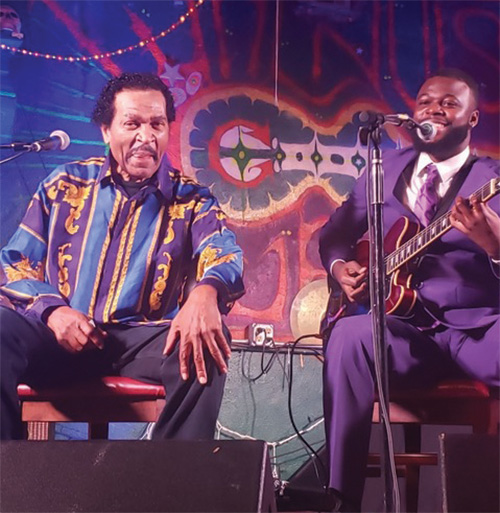
Despite his lineage, Johnson’s journey through the blues didn’t begin until around his nineteenth birthday, coincidentally. He remembers first hearing about his famous great-uncle McKinley Morganfield, better known by his stage name, while he was growing up in Washington County along the Mississippi River. But while his mother kept some of his records around the house, given to her by Fred Morganfield, Waters’s brother, Johnson was pursuing a different course in music.
“I would hear the name,” he says, “but I grew up in the church playing gospel, so I didn’t know the importance of Muddy Waters.”
As a member of the Delta Sensations gospel quartet, Johnson spent his teenage years immersed in the music of Sunday mornings when he wasn’t reveling in the vocal groups and harmonies of Motown R&B and Southern soul. Like scores of other blues artists before him, though, eventually those gospel roots yielded to the blues music popularized by his very famous great-uncle.
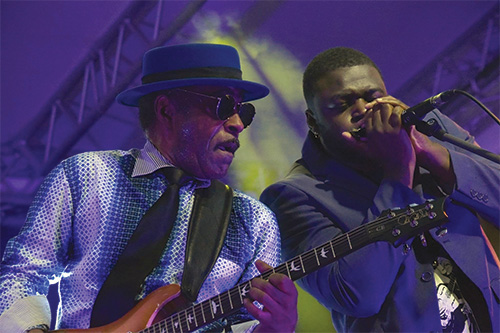
By the time Johnson was in college at Delta State University in the early 2010s, he had picked up the guitar, with some helpful lessons from Reverend Timothy Matthews, and backed the Delta Sensations with his newfound six-string skills.
“I was eager to learn, and I was up many a night trying to figure out chord progressions,” he says. “We didn’t have YouTube around the house; didn’t have internet access. I was listening to the radio, trying to figure it out and learn and develop. But I was just excited to play one note at times.”
He began playing blues while studying for his audio engineering degree at the university’s Delta Music Institute, where he performed with student-led bands like Ol’ Skool Revue, which covers classic blues, funk and R&B songs, and the DMI All-Stars, which covers the songs of Grammy-winning Mississippi musicians.
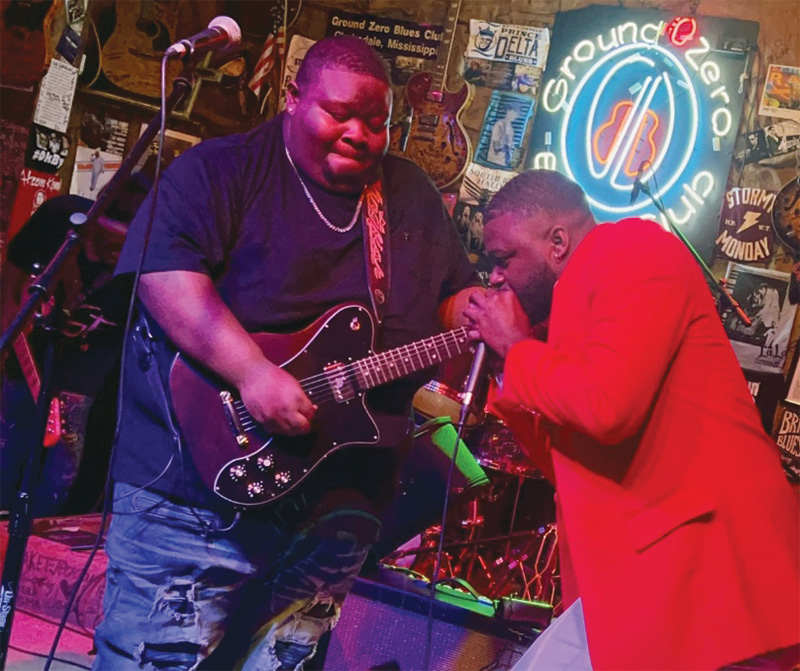
“They asked me to sing ‘Hoochie Coochie Man’ in that band because of my connection to Muddy Waters and Muddy Waters’s connection to Mississippi and the Grammys,” he says. “And that launched me to sing more traditional blues.”
Johnson’s natural talent and determination opened the door for him to explore the blues, and his familial connection to one of the most revered and celebrated artists in American music proved intriguing for audiences and other artists alike. At the International Conference on the Blues in 2015, organized by the Delta Center for Culture and Learning at DSU, he performed a Delta-fied version of Mississippi John Hurt’s “Make Me a Pallet on Your Floor” with Dom Flemons, a renowned folk-blues artist and onetime member of the Carolina Chocolate Drops.
The following year, he performed both at the Chicago Blues Festival and the International Blues Challenge in Memphis, where he met and performed with contemporaries and band members of Waters, including guitarist Bob Margolin, harmonica and guitar player Leslie “Lazy Lester” Johnson, and saxophonist Eddie Shaw from Bolivar County, who jammed with Ike Turner as a teenager and later led Howlin’ Wolf’s band.
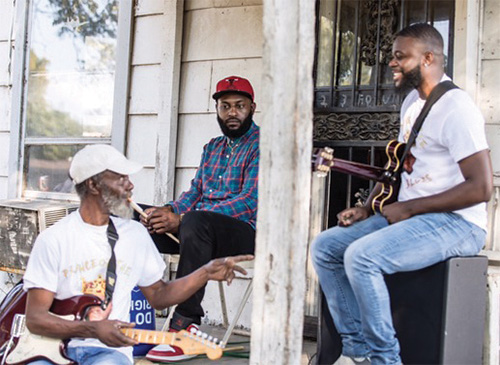
Johnson began visiting the Central Mississippi Blues Society’s weekly Blue Monday gig at Hal & Mal’s in Jackson, and performed shows with contemporary blues artists Castro “Mr. Sipp” Coleman and Grady Champion, with whom he toured as a guitar player. Lately, Johnson has collaborated with performer, songwriter and producer Vasti Jackson, who hired him in 2022 to perform in his backing band, the Mississippi Trinity, on a European tour.
“Keith has a unique voice, and the thing that really impressed me is his dedication and his work ethic,” Jackson says. “And the other thing is that he loves the art and appreciates his lineage.”
Jackson, who previously worked as a songwriter and arranger at Malaco Records, and as bandleader for Bobby Rush’s band, has become a mentor of sorts for Johnson. He’s currently producing Johnson’s upcoming album at his studio in Hattiesburg, including the song “Nephew Muddy,” which will be released this spring. In his music, he says, his protégé is drawing from a long history that predates Waters but continues through him.
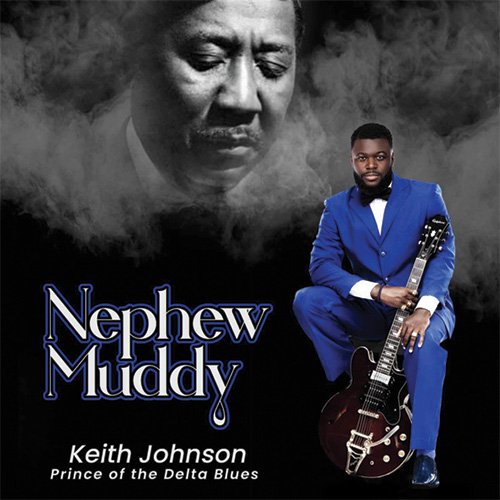
“Anybody can play any style of music they want,” Jackson says. “You can play the song, but you can’t play the culture. Thousands of years of ingredients have brought us to this point in time, and it’s a beautiful thing for me to not only witness that, but to be invited to participate and have a role in maintaining it. So, with Keith, I’ve heard his voice develop as a singer and his playing as an instrumentalist. But one thing is the same now from the first time I met him, and that’s his spirit.”
Beyond the blues, Johnson has his hand in other creative endeavors, as well. He recently finished writing Freeman: Pure Blood, the sequel to his 2022 self-published crime thriller, Freeman: Opening the Case, which will be available in summer 2024. And his musical interests and capabilities run deep.
“I’m a part of a tree, and I’m a branch or a leaf of traditional blues, traditional gospel,” he says. “Now, with that being said, the direction I’m heading towards, I can pretty much do anything once I continue to develop my style and my sound. I can go sing a pop song. I can sing a nice Southern soul song, like Sam Cooke or Otis Redding. But my roots are traditional blues.”



